The Collective of Sex Workers and Supporters (COSWAS) yesterday rallied outside the Legislative Yuan, calling for the complete decriminalization of the sex industry, before meeting lawmakers from the two main political parties.
The rally comes just a month before a clause in the Social Order Maintenance Act (社會秩序維護法) that penalizes sex workers expires.
Article 80 of the Social Order Maintenance Act, which penalizes sex workers, but not their clients, was declared “unconstitutional” by the Council of Grand Justices on Nov. 6, 2009, and it gave the government and the legislature a two-year period to amend the law.
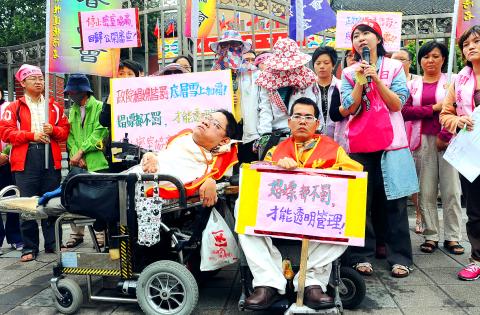
Photo: Chang Chia-ming, Taipei Times
According to the interpretation, the council declared the clause unconstitutional because it believed that penalizing only sex workers violates of the spirit of equality embodied in the Constitution.
However, while the specific clause expires on Nov. 6, a revised law has yet to pass a legislative review.
Currently, there are three proposed amendments.
One proposed by the Executive Yuan would authorize local governments to create red light districts where prostitution is legal, but it would remain illegal outside such districts.
Another proposed by Democratic Progressive Party (DPP) Legislator Huang Sue-ying (黃淑英) seeks to penalize the client, but not the sex worker, while a third version proposed by Chinese Nationalist Party (KMT) Legislator Cheng Li-wun (鄭麗文) would decriminalize the sex trade for both the worker and the client if passed.
“The Executive Yuan’s version of the amendment only makes the situation worse because it would penalize both the sex worker and the client outside of a designated area, which is to be decided by the local government,” COSWAS executive director Chung Chun-chu (鍾君竺) said at the rally. “So when local governments refuse to create red light districts — which seems to be what would happen — it would be a de facto ban on prostitution.”
After a rally outside the Executive Yuan, COSWAS representatives petitioned lawmakers from both the DPP and the KMT.
“Right now, we don’t consider the Cabinet-proposed draft amendment our only option. We would first have to decide whether sex workers and clients should both be penalized, or if both should be exempt, before deciding whether to create red light districts,” KMT caucus deputy secretary-general Pan Wei-kang (潘維剛) said after the meeting.
On the other hand, DPP caucus whip Tsai Huang-liang (蔡煌瑯) panned the Executive Yuan’s proposal to create red light districts as “irresponsible,” adding that the DPP caucus believed that sex workers should be protected.
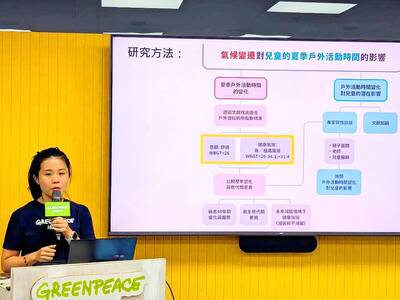
The government should improve children’s outdoor spaces and accelerate carbon reduction programs, as the risk of heat-related injury due to high summer temperatures rises each year, Greenpeace told a news conference yesterday. Greenpeace examined summer temperatures in Taipei, New Taipei City, Taoyuan, Hsinchu City, Taichung, Tainan and Kaohsiung to determine the effects of high temperatures and climate change on children’s outdoor activities, citing data garnered by China Medical University, which defines a wet-bulb globe temperature (WBGT) of 29°C or higher as posing the risk of heat-related injury. According to the Central Weather Administration, WBGT, commonly referred to as the heat index, estimates
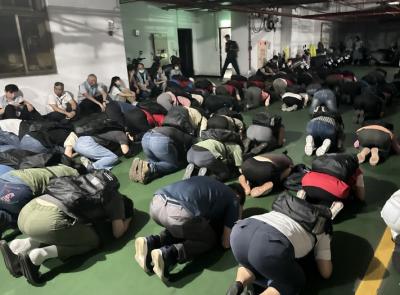
Taipei and other northern cities are to host air-raid drills from 1:30pm to 2pm tomorrow as part of urban resilience drills held alongside the Han Kuang exercises, Taiwan’s largest annual military exercises. Taipei, New Taipei City, Keelung, Taoyuan, Yilan County, Hsinchu City and Hsinchu County are to hold the annual Wanan air defense exercise tomorrow, following similar drills held in central and southern Taiwan yesterday and today respectively. The Taipei Mass Rapid Transit (MRT) and Maokong Gondola are to run as usual, although stations and passenger parking lots would have an “entry only, no exit” policy once air raid sirens sound, Taipei
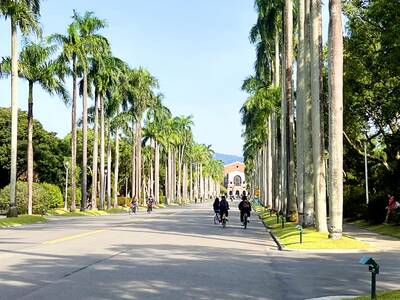
Taipei placed 14th in the Quacquarelli Symonds (QS) Best Student Cities 2026 list, its highest ever, according to results released yesterday. With an overall score of 89.1, the city climbed 12 places from the previous year, surpassing its previous best ranking of 17th in 2019. Taipei is “one of Asia’s leading higher-education hubs,” with strong employer activity scores and students “enjoying their experience of the city and often keen to stay after graduation,” a QS staff writer said. In addition to Taipei, Hsinchu (71st), Tainan (92nd), Taichung (113th) and Taoyuan (130th) also made QS’ list of the top 150 student cities. Hsinchu showed the
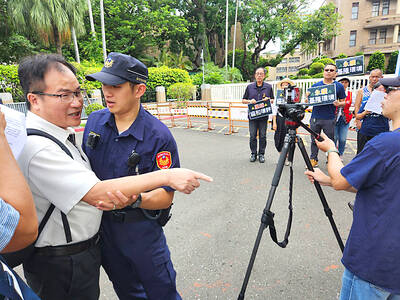
Environmental groups yesterday filed an appeal with the Executive Yuan, seeking to revoke the environmental impact assessment (EIA) conditionally approved in February for the Hsieh-ho Power Plant’s planned fourth liquefied natural gas (LNG) receiving station off the coast of Keelung. The appeal was filed jointly by the Protect Waimushan Seashore Action Group, the Wild at Heart Legal Defense Association and the Keelung City Taiwan Head Cultural Association, which together held a news conference outside the Executive Yuan in Taipei. Explaining the reasons for the appeal, Wang Hsing-chih (王醒之) of the Protect Waimushan Seashore Action Group said that the EIA failed to address